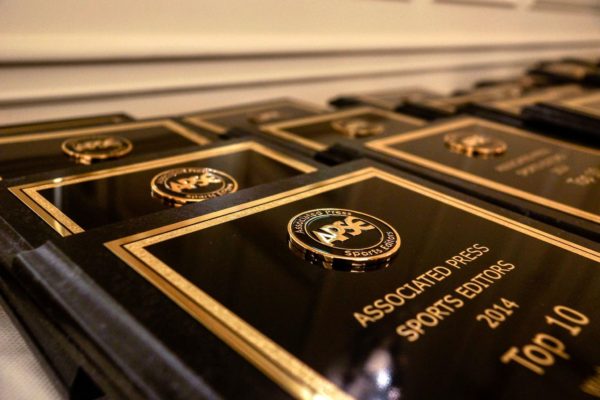By Jake Kaplan, Penn State student
Washington Post columnist Sally Jenkins and photographer John McDonnell stood at the doorstep of Joe Paterno’s modest, four-bedroom ranch home north of Penn State’s campus in mid-January, full of apprehension and unsure of what to expect.
“(McDonnell) turned to me and he said, ‘This is the first time in 30 years I’ve had butterflies on a story,’ “ Jenkins recalled. “And I said, ‘You know, me, too.’ "
Jenkins, an award-winning columnist and writer, was granted an exclusive interview with Paterno a little more than a week before he died of lung cancer on Jan. 22. She and Post sports editor Matt Vita discussed the story, which was published Jan. 14, during the first afternoon panel at the APSE Mid-Atlantic Region workshop.
“It was absolutely the most pressure I’ve ever felt on any story ever. Ever,” Jenkins said. “I mean it was throw-up time.”
But after it was all said and done, Jenkins had churned out a 130-inch story that Vita said was “masterful” and “worth every word.”
At the time, the former Penn State coach had kept quiet since being fired Nov. 9 in the wake of the Jerry Sandusky child sex-abuse scandal. Paterno had also been battling the cancer, which he was diagnosed with just days after his termination.
So how did the Washington Post get the story? “It fell in our laps,” Jenkins said.
It started with a phone call from Dan McGinn of TMG Strategies, a communications adviser the Paternos had hired. Jenkins said she thinks the original plan was for Paterno to do a television interview (Jenkins said she heard possibly with Barbara Walters), but the former coach was too sick to go on camera.
Jenkins had met Paterno only once as a young reporter. (Her father, Dan Jenkins, wrote a Sports Illustrated profile of Paterno in 1968 when the coach was a rising star. “Paterno must’ve asked me four times, how’s your dad?”)
Many of the terms of her interview were negotiated beforehand, such as whether the Post could bring a photographer (they did) and the presence of McGinn and attorney Wick Sollers at the table to monitor the interviews.
The interview was broken up into two sessions. McGinn had told Jenkins that Paterno, who had lost his hair from the chemotherapy and was in a wheelchair, wasn’t too lucid at times and could lose the thread of conversation.
“Everything was just more tense,” Jenkins said. “We were pressed for time, pressed for lucidity. There was a million tensions going on. Fortunately, Paterno himself, he had such a good sense of humor that he ended up breaking the tension. Not me. He started cracking wise in a couple of instances and everything just sort of relaxed. And it became what you want every interview to become, which is a conversation.”
Jenkins spoke to Paterno for about 30 minutes the first day and got about seven or eight more minutes with the iconic coach at his bedside the next day.
Starting at 4 or 5 p.m. that day after the second interview, Jenkins stayed up all night writing the story so it could go on the Post’s web site the next day. “I thought I was back in college,” she said.
Looking back, Jenkins said she thought it was a “pretty good interview” given the circumstances. Of course, she wishes she had had more time with Paterno and there is at least one comment that she wishes she had followed up on better.
“A lot of people after the interview felt like there was no ‘kaboom’ explosive quote,” Jenkins said. “I think that was wrong. I think his ‘I never heard of, of, rape and a man’ was a big deal. That was a big-deal quote.”





